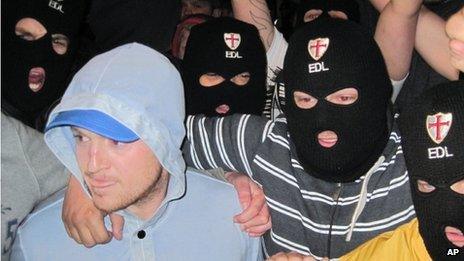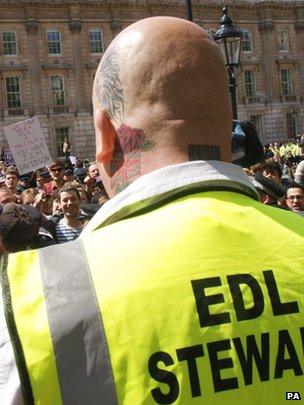EDL leader's Oxford Union appearance cancelled
- Published

Tommy Robinson, aka Stephen Yaxley-Lennon, was arrested at Saturday's EDL march
English Defence League founder and leader Tommy Robinson's planned appearance at the Oxford Union has been cancelled amid security concerns.
The institution, which had faced criticism over the event, said it could not afford the security to welcome him.
Mr Robinson said the union had bowed to "threats of violence" but provided no specific details.
The EDL, which was founded in 2009, protests across the UK against "radical Islam".
'Neutral arena'
The president of the Oxford Union, Parit Wacharasindhu, wrote an email to Mr Robinson on Monday informing him of the decision to cancel his appearance at the debating society.
"Unfortunately, as we are a student society running on a budget based on student membership, we will be unable to cover the significant security costs that would be required to host you as a speaker," he wrote.
A day later, he defended the original decision to invite Mr Robinson, saying his view had not changed since the proposal was made in July.
At the time, he said:, external "The Oxford Union is a debating society founded on the principle of free speech. It provides a neutral arena where political views can be aired so long as they are contested. No speakers are ever given a platform, nor are their views ever endorsed by the society or any of the individuals in it."
The Oxford Union has a history of inviting speakers from a range of backgrounds, from Albert Einstein in the 1920s, to Katie Price in 2011.
It caused controversy earlier this year when it emerged that it had invited BNP leader Nick Griffin to speak at a debate on same-sex marriage. The invitation was later withdrawn.
Mr Griffin had spoken at the Oxford Union before. In 2007, he shared a platform with the Holocaust-denier David Irving. Their appearance was met with protests as students clashed with security staff and staged a sit-in.
Safety 'threat'
EDL marches and demonstrations have often attracted hundreds of counter-protesters, resulting in scores of arrests.

EDL demos have seen violent clashes with police and anti-fascists in the past
The president of the Oxford University Student Union said he was "delighted" the invitation had been withdrawn and said it "should never have been issued in the first place".
Tom Rutland said: "Fascist speakers who spread hate and threats that extend to our students and the wider community, and often bring with them a rally of violent and dangerous thugs, are clearly a threat to the safety of students and other residents of the city.
"There is no value in inviting or hosting hate speakers in the name of 'free speech' when they themselves do not believe in free speech nor a free society, and stand on a platform of oppressing people because of their race, religion, gender or sexuality.
"Community leaders within the city had expressed their sadness and dismay to us that this nasty individual had been invited and that local residents feared for their safety.
"The EDL are simply the newest torchbearers of the dying but dangerous fascist movement in the UK and they have no place in our university, or in our city."
Mr Robinson said that "threats of violence" were behind the decision. Although he could not provide specific examples, he said they were regular. "It would have been just like Tower Hamlets," he said, a reference to Saturday's EDL march which attracted hundreds of anti-fascist demonstrators.
He denied demanding extra security and said that he would have provided his own. But, he said, the Oxford Union wanted a "ring of steel".
"The Oxford Union is one of the most historical and famous Oxford University places for debate. They should be upholding that debate," he said.
During the EDL march on Saturday, Mr Robinson - whose real name is Stephen Yaxley-Lennon - was arrested and charged with not adhering to the conditions of the march and inciting others to do the same.
He was bailed and is due to appear in a magistrates' court on 22 October.
- Published8 September 2013
- Published7 September 2013
- Published8 September 2013
- Published29 June 2013